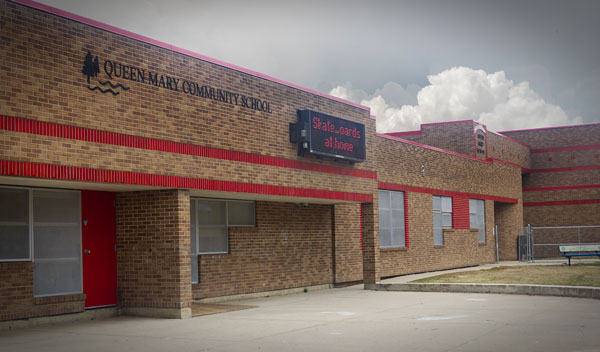
Two Prince Albert schools were among the eight selected to implement the Specialized Support Classroom Pilot Project on Tuesday.
Queen Mary Public School in the Saskatchewan Rivers Public School Division, and St. John School in the Prince Albert Catholic School Division will take part in the program, which aims to help school staff manage and de-escalate behavioural incidents.
The provincial government committed $3.6 million to the program in January.
Saskatchewan Rivers director of education Neil Finch said the investment was small compared to how big the division’s need is, but he welcomed the support.
“Queen Mary has been chosen and they are well on their way to get things started there,” Finch said.
“To be frank, for what that would look like, we could have seven or eight of our schools be candidates. We just slowly narrowed down to where we thought the best fit would be, knowing that there’s other schools that would have been great fits as well. What I would say to that is that Queen Mary was one of many that could benefit from a program like this.”
Participating school divisions have selected schools and are developing plans to meet their local needs.
The pilot provides classrooms with specialized support to help students practice self-regulation skills while also addressing the impacts of disruptions in the home classroom. These classrooms will have capacity for 15 students and are staffed by a minimum of one teacher and two educational assistants. Other staff support may also be used, including psychologists and counsellors.
Superintendent Tom Michaud shared the plan he and his team have created to take part in the provincial pilot project during the closed session of Monday’s Sask Rivers board of education meeting.
The plan creates a specialized learning centre in the school to provide universal, small group and target support for students to develop regulation skills.
The centre will be supported by a newly created classroom teaching position, two educational assistants and a part time Land Based Learning teacher.
This new staff will also work with existing supports in the school such as school administration and the learning support teacher. This model will be monitored closely with metrics to meet the Ministry‘s expectations of the pilot project.
The pilot program will take place for the remainder of this school year and the entire 24/25 school year.
According to an internal report provided to the Herald it is not a classroom with 15 students assigned to it, but a model where students will flow in and out of a learning space that is designed to meet their needs.
The Centre will support students from K-8. The division’s goal is to establish a system where both teachers and students are supported by looking at the classroom as a learning community.
The Centre will align with our current model of inclusion as students will remain a part of their classroom community but will have focused instruction on their individual area of need. It will also incorporate land-based learning and Indigenous Perspectives with
the support of an allocated half-time FTE Land-Based Learning Coach.
“Much of what we aim to do will be things that will support our school community as an entity,” the report states. “In the end, it is our hope that we have equipped our students with the ability to self-regulate, supported our staff with the implementation of universal strategies in homerooms, and increased success and satisfaction for all at school.”
According to the budget projections included in the report, the cost for the project will be $150,000 for the remainder of this school year and $300,000 for the 2024-2025 school year.
The design aligns with similar collaborative models for intensive supports that already exist in the division. It also supports a goal that supports can be implemented in the student’s regular classroom.
Specialized Learning Centres in the division are places for purposeful planning and delivery of supports for students with complex needs. According to the memo, the project could begin as soon as Monday, Feb. 12, or the day before the announcement.
“We look forward to working with the selected schools as they address their specific needs using the Specialized Support Classroom,” Education Minister Jeremy Cockrill said in a press release.
“In supporting students, teachers and staff, this pilot aims to reduce interruptions in the classroom and provide additional support to the students who need it.”
Other schools included McKitrick Community School in the Living Sky School Division, St. Mary School in Light of Christ Catholic Schools, Father Vachon School in Greater Saskatoon Catholic Schools, King George School in Saskatoon Public Schools, Arcola Community School in Regina Public Schools and St. Augustine School in Regina Catholic Schools.
According to the province this pilot project builds on the Government of Saskatchewan’s commitment to supporting students, teachers and classrooms through previous investments of $47 million toward enrolment, complexity and the hiring of more educational assistants, as well as the more than $300 million in supports for learning announced earlier this year.
The Saskatchewan Teachers Federation has been using these pilot projects as examples of the Government addressing matters they want at the negotiating table like classroom complexity and other sticking points in their labour action. The STF and province returned to the negotiating table on Monday, no updates from either side have come since then.
michael.oleksyn@paherald.sk.ca

